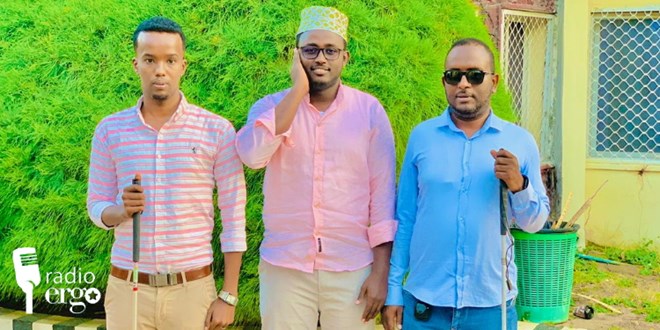
Monday July 31, 2023

(ERGO) – Hassan Mohamud Yusuf, 30, has been facing discrimination and closed doors whilst looking for jobs in media in the Somali capital, Mogadishu, where he should be able to apply his skills.
Both his legs are paralysed from a bout of polio he suffered at a young age.
Yet as a father of four he has been struggling to provide a living for his family and depends on his relatives for their rent and food.
“Today I am a person who cannot sufficiently support his family. Every morning I tell people that we are struggling and have to ask for help.
If I could earn a living using my skills, I would be able to take care of my family,” he said.
Hassan is passionate about communications and in 2017 he graduated with a higher diploma in journalism Royal Academy in Mogadishu. He has had three jobs between 2019 and 2021 but the longest he stayed in any job was just three months.
“People who don’t have physical disabilities have been getting better treatment and preference in the workplace. They are getting paid. I have always been discriminated against and people didn’t believe I could work. I wouldn’t get paid and they made me feel like I wasn’t good enough,” he complained.
Hassan said none of the workplaces he experienced made even basic provisions for those with disabilities, such as providing an inclusive working environment where he did not have to struggle simply getting up the stairs.
Similarly, Mohamed Hassan Muhyadin, who was taught videography by a friend and demonstrated talent, has been struggling to earn a living using his camera.
He graduated in computer science and engineering from Job Key University in Mogadishu in 2020. Despite looking for employment at different media houses including TV stations he has not had any success.
“I’ve tried several times to work in this profession. But the companies where I asked for a job told me they needed someone who can hear and can’t hire someone with hearing challenges. I am sure that I am good as a cameraman,” said Mohamed, who replied to Radio Ergo’s in interview questions in writing.
Mohamed has always wanted to be a journalist translating news in sign language for people with hearing problems. He has now switched to a career as a teacher to earn a living, as his hopes of joining the media have been reduced by the stigmatisation.
“It had such a huge impact on me that I even gave up my photography and put away my camera. If a disabled person can’t find a job, it is not the same as for other people, as he thinks he was left behind because of the disability. That is what I have experienced,” he said.
Blind and visually impaired journalists have also been struggling to work at media stations.
Abdirahman Abdullahi Ahmed, who is blind, has worked in various media in the past four years. He decided to quit in 2020, when he saw that he did not enjoy the same treatment or rights as other staff.
He is now looking for jobs outside journalism to make ends meet for himself and his dependent parents. He says he has lost confidence in employers.
“It is normal for me to be blind, and my management at work knew about it. But there were many things I couldn’t get, such as a salary raise, and I saw new people getting promoted while I remained there. Then you just realise that this is because of your disability,” he said.
The secretary of the Somali Association of Journalists with Disabilities, Abdifatah Mohamud Galgal, said people with special needs often face unemployment.
He said he knows of more than 100 young people with disabilities in the country who are employed despite having studied journalism.
Their association, established in 2018, has spent the last two years raising awareness about the potential of people living with disabilities. It currently has 120 members.
Abdifatah noted that some qualified disabled people were not treated in accordance with their rights even if they found a job.